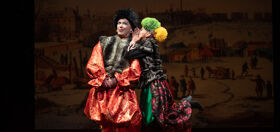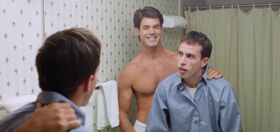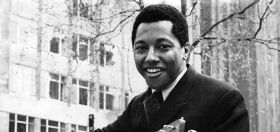
We like to think of Queerty as one big dysfunctional family, and we’re looking to add a new member to our brood. With nepotism and insider-dealings passe in our scary, newly impoverished world, we decided that instead of choosing a music reviewer, we’d let you, the readers, decide. So when you ask yourselves, “Who put this guy in charge?” the answer will be, “You did.”
After culling through almost 200 applications, we narrowed down your would-be musical tastemakers to 10 lucky finalists. To be honest, we’re glad you’re the ones deciding—this is one talented group. This week, we’re rolling them out for you – along with a sample review of one of their favorite albums – the top five will go on to the final round. Vote for your favorites Idol-style (that means as often as you like) at the bottom of this post, until, like a gay, musical version of Highlander, only one remains.
Let’s meet the contestants.
Tomás Boatwright
How about we take this to the next level?
Our newsletter is like a refreshing cocktail (or mocktail) of LGBTQ+ entertainment and pop culture, served up with a side of eye-candy.
I am an ideal fit for this position because I would add to the intelligence, creativity and cleverness of the blog. Aside from reading, I spend a great deal of time writing. I pay careful attention to infusing my voice, and the diverse experiences I have had, into my written work. Additionally, I possess a musical pallet that speaks to the diversity I embrace. In a world of so many divisions, I believe music truly transcends difference. In my own collection, I have something for everyone—from J Pop to Trip Hop, Vogue to Pop.
Sam Sparro–Sam Sparro
It seems as though everybody and their fairy gay-father cites Prince as a musical influence. While 1999 may have sparked magic for some, few artists actually pay true homage to the artist formerly known as. Sam Sparro is the truth. His debut album, by the same name, takes the listener on a journey to a world live in living color. I won’t even go into how much of a cutie the Australian-born, Los Angeles-raised, singer/songwriter is. The boy’s got talent! And he’s got the Grammy nomination to prove it.
His debut album is just as poignant, as it is danceable. At the end of shaking your tail-feather to most of the 14 songs, it is Sparro’s message that most resonates. After spelling it out who Sam Sparro is, on the first track, Sparro goes to work. “Two many questions” is a cool and easy tune that seeks to encourage the listener to reflect on self-purpose and action. How do I matter in the grander scheme of things? Next, is Sparro’s hit, “Black and Gold.” While the divine inspiration may be touchy for some, how encouraging is it for an openly gay man to embrace his spirituality? In this song, Sparro sings, “If vision is the only validation, then most of my life isn’t real.” Certainly, this goes beyond church. Think: love.
Other great selections include, “Sick,” Hot Mess,” Cut Me Loose” and “Sally.” In these gems, the listener can really see how Prince influenced Sparro’s music, but also how music genre’s like R&B, Soul and gospel add to his creative delivery.
Sam Sparro serves up something fierce—up-tempo beats, soulful vocals, even jazz scats on the hidden track. Get into him. If this is what he offers on the first try, sky’s the limit for the next go ’round.
Chris Hanson
I would be the best music reviewer for Queerty because I’m in a queer electro-rap group, I have an English degree, and I cry a little inside every time a gay bar plays The Pussycat Dolls or Katy Perry instead of Hercules and Love Affair or Von Iva. I’m constantly on the lookout for new gay and queer-oriented music, while continuing to discover the wealth of underappreciated gay artists from the past. There’s nothing I enjoy more than raving about new queer music while picking apart the overly-manufactured crap that gets more airtime in the gay community than it deserves.
Von Iva — Our Own Island
Sexy, loud, and all about love. If one had to sum up San Francisco trio Von Iva, that would just about do it. While their mission of inducing dancing and lovemaking hasn’t changed from their debut, their sound has become even more raw, stripped down, and soulful on 2007’s Our Own Island.
“Guise,” the first track on the album, demonstrates how the amps-set-to-11 rock of their debut has been toned down to allow each element of the band to truly shine. Lead singer, Jillian Iva, struts through the song, declaring that she’s “seen a lot of guys trying to fake a front.” If there’s ever a band that can speak out against artificiality, it’s Von Iva. With just drums, keyboards and one big voice, there’s not a lot they can hide behind. No guitars for these ladies. They manage to rock harder than the boys without having to resort to a single powerchord or overblown shredding solo.
They make the most of their unique setup on the tracks “Lala” and “Where U At?!?” in which keyboardist, Bex, makes her keyboards roar like some sort of monolithic dinosaur-sized organ from hell and drummer, Lay Lay, sounds like she’s pounding away on the most kick-ass set of trash cans heard since Kraftwerk’s “Metal on Metal.” It could be theorized that the amazing interplay between these two instruments has at least something to do with fact that Bex and Lay Lay have been dating throughout the existence of the band.
The band does sounds like they’re in unfamiliar territory when they slow things down to a near-ballad on “All of Her Life She Has Wanted to Fly,” but the energy of the rest of the disc certainly compensates. Von Iva truly rocks.
Mark Hefflinger
I am a writer by trade, with a day job as an editor, freelance music writing gigs on the side, and various fumblings with blogs (i.e. I can meet deadlines). I believe there is a tragic dearth of coverage of the amazing range of queer indie artists — especially from a queer perspective — aside from an occasional profile in The Advocate, or a fleeting mention of gayness on Pitchfork. Beyond album reviews, I’d love to interview queer artists, and add concert reviews with a Cobra Snake-esque (although less fashionista-obsessed) “hot guys at shows” photos section.
Cat Stevens–Harold and Maude Soundtrack
Prior to recently, a soundtrack to Hal Ashby’s cult classic 1971 film Harold and Maude had never been released. This writer wasn’t even aware that journalist and filmmaker Cameron Crowe’s Vinyl Films record label had just issued a vinyl-only, limited-edition-of-2,500-and-already-sold-out version before gleefully unwrapping a copy his boyfriend bought him for his birthday.
All of the shiny-happy Cat Stevens songs featured in the film had been released before, but this completist Crowe curation includes gems like the precious piano and banjo takes on “If You Want to Sing Out” from the film; a 7-inch with unreleased demos; the film’s Japanese poster; and a booklet of fascinating interviews with Stevens and the film’s cast and crew, conducted by Crowe.
The two tracks that Stevens — who was, at the time, on the cusp of megastardom — composed specifically for the film, “If You Want to Sing Out” and “Don’t Be Shy,” dovetail beautifully with the philosophical bent of the film. Their simple, earnest truths can also be viewed, like the film, through a queer lens. [“If you want to (come) out, (come) out”; “Don’t wear fear, or nobody will know you’re there/ Just lift your head, and let your feelings out instead”].
Is Harold a latent homosexual? Clues: the brilliantly campy relationship between Harold and his mother; Harold’s multiple suicide attempts that relieve him from mother-approved blind dates; his dapper fashion sense; and his pursuit of a taboo, Forbidden Love relationship — albeit with a septuagenarian, dope-smoking loony-woman.
Ruth Gordon (Maude), treasure that she was, could well have been merely a surrogate for the true taboo that screenwriter Colin Higgins, who was gay and died of AIDS in ’88, was driving at. Hearing these beloved Cat Stevens tracks again, “secret meanings” in mind, has, at least, much improved their previous associations as the cheesy soundtrack to too many let’s-get-in-touch-with-God Catholic high school retreats.
Andrew Hickey
Currently I work as a music director at a college radio station, where I live and breathe music. Each week I listen to 25-50 new albums. I enjoy being aware of the newest trends in music and am very aware of what is up and coming. I am interested in music of all genres. I enjoy finding new music as well as emerging queer artists (it’s awesome when you can fully connect with music). It’s hard to weed through music featured in blogs in order to find something worthwhile but I want to help people find the best new music.
Late of the Pier–Fantasy Black Channel
Late of the Pier an English four-piece band have finally released their debut album Fantasy Black Channel in America. Originally released in England in August of 2008, LotP appear ready to make a breakthrough here.
Listening to the opening lines of “Space & the Woods” listeners may have to check to make sure they didn’t accidentally put in a Gary Numan track from the 80’s (You know, that song about cars) . LotP have to be growing tired of the Numan comparisons by now but it’s not in a bad way necessarily either. LotP’s sound ranges from straightforward 80’s inspired synth-rock to fusions of different genres such as the opening riff of “Focker” that sounds like a hair metal riff redone by a keyboardist and the breakdown on “The Bears are Coming” that sounds like a mix between the soundtrack music found on Pee Wee’s Playhouse and a robot having an orgasm.
Each song on the album is filled with energy, odd when compared to some of the lyrics such as the opening lyrics of “Space & the Woods”: “Suicide is in my blood/ It always was.” Examining the lyrics one might say that LotP is a goth-dance band, and it would be a fairly accurate statement, but instead of crying in a corner these guys know how to make someone dance. The lyrics are simple yet will stick in your head after a listen. “Heartbeat” and “Bathroom Gurgle” offer simple choruses that you may find yourself singing out lout to.
Overall, Fantasy Black Channel is a solid debut album. Some of the lyrics may seem a bit juvenile and the splash of glam that the band incorporates may not be for everyone, but they do know how to make people dance and rock out at the same time.
Eric Jost
Since 2005, I have worked as a freelance writer focusing on LGBTQ issues, sex positive culture, politics and the media. My writing experience aside, I have a general love of music. I purchase several albums a month and enjoy discovering up-and-coming artists. Recently, I have been following the Australian and UK indie-dance scenes, but my tastes range from mainstream pop to soulful R&B – making for an interesting and diverse music column.
Lykke Li–Youth Novels
Although this Swedish songbird’s debut album has been climbing the charts in Europe since early-2008, it is on the eve of her first North American tour that Lykke Li (pronounced “Lick Lee”) is finally garnering some attention stateside. However, while her Swedish predecessors (such as Robyn) have cornered the dance-pop market, Lykke Li seems more comfortable following in the footsteps of her more experimental Scandinavian neighbor, Björk.
People who purchased Youth Novels hoping for fourteen “I’m Good, I’m Gone” (Li’s impressive debut single, accompanied by one of the most unique music videos in recent memory) clones might be severely disappointed. Youth Novels is not a dance album; and starting off with “Melodies & Desires,” one quickly discovers that the album is much more personal and introspective than “I’m Good, I’m Gone” lets on. That is not to say, however, that Youth Novels is without energy. Li oscillates between soulful confessionals, such as “Little Bit” and “Everybody But Me,” and more electronic entries, including the masterpiece, “Breaking It Up.” But even the poppier songs on the album maintain Li’s personal exploration, using dance rhythms to underscore often self-deprecating lyrics.
Being her first album, Youth Novels is not without its missteps. The incredibly short bridge, “This Trumpet In My Head” adds nothing to the album’s depth; while “Complaint Department” sounds interesting musically, but runs a little bit too long without traditional song structures holding it together. But as she is only 22-years-old, Lykke Li offers listeners a promising debut, setting herself up for what will hopefully be a long and illustrious career.
Robert Maril
Not every gay person listens exclusively to Cher and Madonna, and a site like Queerty should do what it can to foster new and emerging gay/gay friendly artists, be they indie, pop-rock, r&b, rap, or dance. I’m the guy for the job because I’ve been an avid pop (meaning non-art) music fan since grade school, because I have a lot to say about it, and because it would give me an outlet for those opinions besides my boyfriend. I live in New York City, love going to shows, and have basically no limits when it comes to what I’ll listen to.
Matt Alber–Hide Nothing
The gay community is pulling for Matt Alber’s new album, Hide Nothing, not least because of its back story: reportedly a labor of love, it was recorded in Alber’s bedroom, an indie artist using his limited resources to create something lush and beautiful. The video that accompanies the album’s lead single, “End of the World,” was shot in Alber’s barber shop and caps off with a gay kiss, the camera close-up on the mens’ embrace. Introducing himself to the masses with this video, Alber lays claim to a spot on the music landscape and supporting him feels almost like a political statement.
When the record soars, as it does on End of the World,” Alber comes across as heartfelt, succinct, like nothing so much as Rufus Wainwright if Rufus ever betrayed an earnest emotion. “End of the World” is a perfect pop song, drawing parallels between the uphill climb of a roller coaster to the “edge of a dying romance,” asking “But if there’s nothing left can you tell me why/That it is you’re holding onto me/Like it’s the end of the world?” The strings swell, and Alber’s voice cracks open with emotion. However, “End of the World” proves to be the exception to the rule. With its vague nods to electronica and polite, plodding beats, the rest of “Hide Nothing” owes more to Imogen Heap than Rufus Wainwright. Taken as a whole, “Hide Nothing” becomes a sprawling thing, Alber’s melodies not catchy enough to be memorable, the songs often devolving into electronic, synthesized-piano soundscapes. Drum loops lock into a groove and stay there, providing an anonymous palette for Alber’s capable if seemingly bored vocals.
There is, of course, a place for music like this: a soundtrack for a dinner party; background music at a lounge. If what you’re looking for is more of the lead single, though, you’re better off sticking with the mp3.
Joe John Sanchez III
I worked in gay media for 2-3 years, including a gig with a prominent gay social-networking site, I have a firm grasp of what my fellow gays are listening to. And with modesty aside, my eclectic tastes and already-existent press connections put me in a position to be a tastemaker. From personal connections to lesbian rappers (Shunda K of Yo! Majesty totally loves me) to up-and-coming crunchy guys with guitars, I’d love to explore upcoming queer artists while continuing to evaluate mainstream pop, indie, electro, hip-hop and other genres.
A Camp–Colonia
A Camp’s sophomore release Colonia opens innocently enough with a toy piano, but even the lush, theatrical arrangement of “The Crowning” can’t mask the song’s underlying theme of a beheading. When the musical accompaniment isn’t complimentary to the dismal lyrics, deceptively upbeat grooves may mislead the listener into optimistic territory. Nina Persson of The Cardigans isn’t “pulling a Mary J” and embracing happiness on this side-project, she’s doing what she does best—subtle, melancholic beauty (that’s depressing as fuck).
This motif proves solid on the album’s lead single “Stronger Than Jesus”. The prevalence of the rousing chorus, which states that love conquers dear ol’ Mr. Christ, could potentially cause some to misinterpret this as an anthem for the post-Proposition 8 generation. This erroneous designation could be understood in a world where Springsteen’s “Born In The USA” was viewed as patriotic, but put the tune on repeat and you’ll unmask Persson’s cynicism as she bemoans our tireless quest for companionship, stating that love is “the hammer that will break” us. No hope present– this is the ultimate anti-love song.
The ubiquity of alt-country and 1960s influences creates an air of familiarity, but subsequent listens will unlock Colonia‘s original quirks and intricacies. With hand claps and an epic refrain, “Here Are Many Wild Animals” initially evokes Phil Spector, heads towards power-pop New Pornographers’ territory, returns to Spector and concludes with Perrson whispering about bastards and millionaires. These transitions appear effortless, demonstrating the many surprises A Camp has to offer. Of course, they’re an exception, not a rule, as the majority of the group’s offerings echo pure pop structure, with the sway-worthy “My America” leading the pack. With this album down, it’s clear why Perrson was Swedish pop’s leading blonde babe before the days of Robyn, Karin Dreijer Andersson and Lykke Li.
Bradley Stern
Coco Chanel, once said, “I don’t do fashion…I am fashion.” Well, much like the late, great fashion icon before me, I don’t do music…I am music. Actually, there’s nothing even slightly accurate about that statement. But what I can tell you is that I do know my music. I’m a walking, talking encyclopedia of release dates, chart numbers, and little known tidbits ready to be abused by the masses.
Britney Spears–Circus
Somewhere between the chilly electro stings of “Break the Ice” and the slap-happy bass of “Get Naked,” Blackout suddenly ran cold. The chirpy, cheerful chanteuse that I knew and loved now somehow found herself wedged into the confines of a frigid vocoder, battling her own demons at the time. It was a cold, dark album, devoid of soul and spirit.
Don’t get me wrong, the music was there–In fact, Blackout remains Britney’s sonic peak. However, Britney Spears was not featured on that record. She was credited, she was singing, but there was nothing familiar to be found.
One year later, with a refreshed image and sense of hope, Circus offers the fans a proper comedown from the tumultuous experience over the past four years: A bouncy, bubbly romp between killer choruses and delicate verses. With a mixture of In The Zone’s exploratory pop and Britney’s unapologetic camp, Circus is what I had assumed Blackout to be in the first place: From the pervish, wacky space vibes of “Mmm Papi,” to dancefloor commanders like “Circus,” to the sass-n-boots, glittering ’80’s glitch of “Leather & Lace, Circus offers a taste of everything.
Oddly, the greatest gift of Circus is that the album remains wonderfully flawed. Unlike the processed-to-perfection robotic acrobatics of Blackout, the missteps pour out from the Circus sessions: The songs are hardly as instant (“Blur’), incomplete (“Shattered Glass”), and even off-putting (“My Baby”). Yet in this way, the experience feels legitimate, allowing a listener to find beauty within the flaws.
Circus is Britney’s return to grace, both in form and functionality. Not only because it demonstrates the confidence of the yesteryear Britney in stunning stompers, but because of the album’s promise for musical evolution.
Perhaps the definitive album of the year, Circus delivers pure, unapologetic pop unto its innermost parts.
Daniel Villarreal
Thank God my brother chucked my Karate Kid 2 soundtrack for Peter Shelley. Nowadays I hit up local concerts when traveling, mainline Pandora and Pitchfork like black tar heroine, and pirate new songs* like they’re doubloons. My tastes range from Bob Mould and Pansy Division to Tori Fixx and Arthur Russell. I’m also a Columbia creative writing MFA (with a journalism background) who knows a band’s story, personality, influences, and style can matter just as much as their sound.
*Just kidding—because that’s illegal.
Cansei de Ser Sexy–Donkey
There’s something you gotta love about a Brazilian electroclash band that beats the crap out of each other in prom dresses at a birthday party. In their video for “Alala,” Cansei de Ser Sexy put bloody, burn-scarred faces on the sextet that cobbles deliciously dark dance our of pop-culture trash. In one of the songs off their self-titled debut, the catsuit-clad front woman, Lovefoxxx, called Paris Hilton a bitch about 20 times. In another, she implored listeners to “lick her art tit.” Throw in the fact that they started CSS as a joke, that four of the band members are gay, and that almost nothing from South America ever gets any U.S. airplay, and their international success seems even more extraordinary. Their first album bristled with a vaguely pro-feminist agenda, suspicious of seriousness and studio perfection. In comparison, their second album, Donkey, has scrubbed away their grime—it’d work as background music for a hair salon, but not a birthday brawl.
They began writing and recording the album in tour buses and hotel rooms after losing their bassist and firing their shystie manager. But for all the 4am crying fits, lost luggage set on fire, and going “Raggae All Night,” the songs never lose control or have as much fun as they should. “Give Up” sounds like a mediocre Gwen Stefani track: “This time I won’t make any mistakes/ Will you forget who I am?/ Everything changes in a day/ My heart reminds it’s you I crave.” Add some 8-bit Mega Man loops and you’ve got serious but unaffecting lyrics backed by dancey but repetitive beats. Their gritty indie-electric edge briefly reappears with coasting guitars and crashing drums in “Move,” “Beautiful Song,” and “I Fly.” But mostly, one hears CSS conforming to the pop machine rather than defacing it.
Jay Winkler
I’m not a stereotypical gay guy, and probably not a stereotypical Queerty reader. For starters, I’m bi. I’m a pretty obsessive sports fan, and even have a favorite NASCAR driver. But, other than staring at attractive twinks, the gayest things I do pretty much revolve around music. Whether it’s obsessing over cute (often straight) artists, or knowing more words to “Girls Just Wanna Have Fun” than any girls I know, music and other artistic mediums are my biggest connection to the gay community. I’ve written music reviews for my school’s newspaper, but would really prefer the less formal blog-style.
The Killers– Day & Age
Let’s get a few things out of the way: Yes, Brandon Flowers is a Mormon. No, Brandon Flowers does not support banning gay marriage. Yes, Brandon Flowers is absolutely adorable. Flowers grew up with gay musical heroes, such as the Pet Shop Boys, Morrissey, Erasure, and Elton John, and The Killers even got their start playing in Transgender night clubs in Las Vegas. Flowers grew up in a town designed for Glam Rock, and The Killers certainly bring the glam on their new album, Day & Age. Many have called this album a return to their roots, but, this album is nothing like what the Killers have done before. Which allows them to make their biggest album yet.
The album opens with “Losing Touch”, which has catchy lyrics, excellent guitar work, and, most importantly, lots of beautiful sax. The album moves right into “Human”, which is the best dance song the band’s ever written. The Stuart Price production really comes through, and the song is dripping with pop goodness. The standout track, however, on the first half of the album is “A Dustland Fairytale”, a lyrically and musically beautiful piano ballad alleged to be the story of Flowers’ parents.
The second half begins with the doing things its never attempted before; “This is Your Life” is flanked by African chants, and “I Can’t Stay” is a semi-acoustic track where the highlight is really the sax. The band brings the glam on “Neon Tiger”, a ballad straight from Vegas, and finishes up the album with the dancy “The World We Live In” and the eight-minute mini-epic “Goodnight, Travel Well”, which fittingly ends the album on a downbeat note.
The Killers have a chance to become one of the biggest bands ever. Three albums into their career, they’re playing sold out stadiums and headlining festivals. While the band still has a long way to go, if they continue to bring fresh sounds to their music as they have on Day & Age, they’ll sit in the same echelon as some of the gay artists Flowers grew up listening to.
Now, get voting! Polls are open until Monday, Feb. 16th at 12:00AM.



















Troy Keasling
I would have liked to have had two votes and perhaps a run-off. I would have voted for Jay Winkler as well.
Sebbe
Yes, a run-off would be nice. Please reconsider narrowing it down to the top three with another review by each. Um, some of the people seem down right opposed to reviewing, listening, or writing to any mainstream music at all? I think a nice mix of new pop and up and coming would be nice. Jay was in my top three as well, but I had to vote for another.
Uncle Japhy and David (hehe), please narrow it down after some voting and give us another vote.
Sebbe
Oh, and Mark Hefflinger seems old and billboardish. Give someone new a chance.
Anon
Wow this is an easy one! Only two of these seem to have a clue what so ever. Jost and Sanchez for the win!
Sebbe
Jost actually pronounced her name wrong, its actually said more like (lickey lee), but he seems kewl. Sanchez as well, but he needs a better handle, LOL.
Norman
Audio of the pronunciation of Lykke Li here:
http://forvo.com/word/lykke_li/
It sounds like “lick-uh liu” to me.
Daniel Villareal is the only writer here who didn’t use a cliché (eg. “If this is what he offers on the first try, sky’s the limit for the next go ’round”) or awkward music writing trope (“her keyboards roar like some sort of monolithic dinosaur-sized organ from hell”), so he easily gets my vote.
Heather
Daniel is easily a one of a kind catch and you’d be remorse in not taking him on. His uniqueness would be an obvious asset to any “big dysfunctional family”.
Kaysey
Why aren’t there any women included in the finalists?
ChicagoJimmy
No ladies made the cut to the final ten?
Japhy Grant
@Kaysey: Unfortunately, none applied.
Mike Hughes
I’m voting for Brad! His blog, Muumuse, is so good! He always knows the newest music and he’s so funny!!!
Andy
As a publicist representing independent artists, I have to ask, is there a point to running a negative review of a debut album by an unknown artist trying to break out?
It’s one thing to slap down an overhyped pop icon who should have known better, but an entirely different thing to put the kibosh on an artist who’s not even out the gate. Particularly one who’s self-financed and has done so much charity work for the gay community).
Especially one of our own? I’m not saying love it because it’s gay–there are plenty of crap gay singers out there–but if one can’t say something nice, then perhaps devote the time and typing to an artist one likes? There are so many yet to be heard LGBT voices, which deserve–and would gratefully welcome–positive exposure.
In an era where the consumer can effortlessly listen before he buys, and thus needs no warning from a critic about a particular album, whom does the negative review (of a struggling artist) benefit?
Andy Reynolds
Penetration, Inc.
Sebbe
@Andy – Yes there is a point. Just because someone is gay, doesn’t mean they deserve to be “let out the door”. No one wants to read reviews everything is good and cheery. We want to know not only whats good, hot and new. But, what the reviewer feels is bad and not worth are time. Especially once you come to know a certain reviewer and get a feel if their reviews are similar to your own. That is the point, to save you time.
Same goes for independent films, broadway, all artist.
akn
Am I generalizing when I posit that gay men who like indie-folk/alt-country/singer-songwriter-ish music are few and far between? The only two candidates who seem even remotely interested in that kind of music (Hefflinger and Sanchez, whose handle seems just fine to me) have but 6% of the vote between them…
Amanda
Bradley Stern is amazing. Everyone should vote for him! I read his blog all the time and if he was making reviews for this site, it would be safe to say I’d read THIS site all the time. 🙂
Jill
@Kaysey: Maybe none of them were good.
David Hauslaib
@Sebbe: Please read: “the top five will go on to the final round.” The top five vote getters will join us again next week for another round.
Sebbe
@David Hauslaib – oops, sorry, I’m caffeinated now. Thanks!
JP
Daniel V. is funny and fresh. I agree with Norman — it’s a nice change of pace. I’m looking forward to more from him.
Marc
I’m really digging Daniel V. Funny without being overdone. Fun to read.
Will
I suppose the debate is whether the music guy on a gay blog is going to talk about ‘gay music’ or genuinely good music that may happen to appeal to a gay audience.
Personally, I choose the latter. I hope the winner doesn’t feature third-rate artists just because they are gay. I also believe this blog and a majority of its readers do not fit stereotypes and do not wish to further them. That being said, I am more than happy to hear a review of Britney, but I am suspect of a reviewer who finds her’s the “definitive album of the year”.
All I really want is to be introduced to something new everyone in a while.
Dan
Wow. Doesn’t really help that I haven’t heard most of those albums, and the ones that I have wouldn’t be fit for my iPod.
Michael
These guys are all pretty solid, but it looks to me like Daniel Villareal easily has the freshest, most exciting voice, with props to Joe John Sanchez for some intellectal depth in such a condensed medium. If I had three votes, two to V., one to S. Not sure what Hickey is doing for everybody else.
julian
I really liked Joe John Sanchez at first, and voted for him, but now that I’ve reread all of the reviews for like the fifth time, I have to say that Daniel Villareal is the only one who hasn’t pissed me off. I want to take my vote back and give it to him. Grr. Oh well, there’s always the final round.
Idea
Why not have two or three reviewers do post similar to this one? (Multiple reviews in one post?) I think that would be better considering the variety of taste some of Queerty’s readers might have.
One for the Mainstream/Indie-Hispter kids/The Rock crowd etc.
———-
Too bad there isn’t any hip hop/r&b ones in here tho~
Sebbe
I just checked out Bradley Stern’s site. Pretty good! Check it out if you get a chance boyz.
http://www.muumuse.com/
Matteo Matteo
Vote for Mark Hefflinger because I did.
Chris
I really liked Mark’s. I haven’t even heared the album but thought he gave me a good idea about the music and background. He has a good, friendly writing style.
Joe John Sanchez III
@Idea: FYI, I am a huge hip-hop and R&B geek.
While it may seem rather uncouth for a contestant to comment on a post with voting involved, I wanted to thank everyone for all the kind words. Even if I don’t make it to the top five, it’s great to hear that people appreciate my writing.
Blacktress
Joe John’s blog, itisthemoneyshot.blogspot.com introduces me to new music every time I read it. His reviews are also funny and well-written, so I never feel like the un-cool kid out of the musical loop. I think he’d make a great reviewer for Queerty. I really like some of the other reviews here, but there’s something about JJ’s tone that makes him a bit more chill to me. And, I mean, gay networking sites?! Hello–street cred!
hardmannyc
Why do all music reviewers try to write like they’re writing for the Village Voice?
kevin
I’m for Daniel V. as well. I don’t know him from squat, but his taste in music and his willingness to review bands/music acts from outside of the mainstream (and continental US) rates high on my charts. Since I assume this is rank-choice voting, my second pick is Joe John for much of the same reasons.
SloppySexond
Sloppy like Villareal.
MBS
Team Villareal!!!!
Sebbe
@Joe John Sanchez III – commenting on the board voting for you seems highly unethical to me and a kiss-up. Vote him off the island.
jake
I read them all. Give Joe John Sanchez III a careful read, okay? My choice.
John from England(used to be just John but there are other John's)
@Sebbe:
Oh chill..
We’re big boys and girls, can make our own decisions…
MusicFan
Check out Bradley Stern. Excellent
kevin
@Sebbe: Sebbe…come on now. Don’t you think that’s just a tad bit unfair? I see no harm.
Sebbe
@Kevin –
OK, maybe I was a little melodramatic.
But, I still don’t think that it is ethical and he should have recused himself from posting during the voting.
That said, I’m sure he had the best of intentions.
Lyzi D
While Villarreal comes off as humorous, I don’t see what the hype is all about. Instead of focusing on the album he’s reviewing, he focuses on their first album instead. His humor mostly comes from their own lyrics. It’s easy to feel fresh when you’re using other peoples’ words.
Greg Ever
I’m voting for Andrew Hickey because he seems to have the least stereotypically gay taste in music. He’s also in the best position to discover the most new music on a regular basis.
Although I’m a bit disappointed nobody mentioned they like any sort of hard rock or metal. Where’s the support for guys like Rob Halford?
sal
forgive me all,but Jay Winkler are u nice,smart,hot??and single??do tell
Carrie
Who starts a review with a Karate Kid soundtrack reference? That’s awesome! I’d love to read more from Daniel Villarreal!
Chad
While I am the straight friend voting on here, my whole life from working for independent musicians, opera houses, Juilliard and gigging on my own tells me so much about gay opinions on music. Robert is to the point but clearly expresses his informed ideas on music through a decidedly gay point of view. Stereotypically gay views on music are actually the norm now which is why I recommend Robert’s even and widespread views and vote for him. Besides, he may be the only one on this list who IS an active music performer.
Distingué Traces
This post depressed me because I’ve been writing cover letters all week.
Hire them all, Japhy! They are poor! They have to feed their cat, and they really want an iPhone.
Greg Ever
@Distingué Traces:
Too bad it’s not a paid position.
David
I went with Bradley Stern. I had a hard time deciding between Stern, Boatwright, and Winkler though, I liked them all.
Anon
@Norman: Lykke Li pronounced almost like “luckily” Lück-eh Lee sort of…
well it is hard to explain a language without phonetics…
Sebbe
@anon – ar du svensk? Svenska är svårt att uttala för amerikansk. “”luckily” Lück-eh Lee”” är nära.
Father Stacy
I thought Daniel had the most exciting writing and the best musical taste. I would love to learn about what he’s listening to. We can read reviews of “Circus” anywhere, but I would rather read Daniel’s take on exciting new music than another pop review.
Jenny
Daniel’s got my vote.. anyone who can use words like sextet, cobbles and tail feathers and it makes sense knows their way around the pen!
Peter
@Father Stacy: Newsflash. CSS is not exciting or new.
Scott
@Peter: maybe not, but i’d still rather read about them than britney. no contest here. vote villarreal!
JoeJosh
“…8-bit Mega Man loops…”
I like Maril, but that reference alone scores my vote for Villarreal. I’m a sucker for accurate, colorful analogies. It’s fun, but precisely descriptive.
More, please.
kasper
My vote is for Daniel V.
Michael
I am voting for Bradley. His blog is great:
http://www.muumuse.com/
Fausto Fernos
People are just voting because it’s Britney Spears.
Erica
@Father Stacy:
Id like to see a review of Circus that is even remotely close to being as fabulous as Bradley Stern’s.
If you would like to see true talent check out his blog. I am a long time fan.
http://www.muumuse.com
JoeJosh
@Erica: My problem with Stern is that I do feel like I can get that kind of review elsewhere, and I don’t think it tells me as much about the sound as I’d like.
Even the close, “Perhaps the definitive album of the year, Circus delivers pure, unapologetic pop unto its innermost parts…” I like the sentence (whether or not I agree with the “definitive album” bit), except that I just don’t walk away thinking I know exactly what it sounds like. In the context of the rest of his review, I’m left wondering if he and I have different senses of the innards of pop.
Whereas with Daniel V’s, sure, he could have done a little more to describe the album at hand, but I know exactly what he means when he says “In comparison, their second album, Donkey, has scrubbed away their grime—it’d work as background music for a hair salon, but not a birthday brawl.” I can feel that.
So I’m going with the potential Daniel shows.
Maybe Stern’s got stronger stuff, and I’ll definitely check out his site, but I think he probably could have picked a stronger review than this one.
MikeLA
I’m voting for Robert, because well… I’ve seen his ass and… I want a piece.
Taylor
There are only 3 from the list that I would spend time reading:
Daniel Villarreal…this guy can write and is a pleasure to read. Funny, too.
Joe John Sanchez has got some chops.
As a gay rocker myself, I would most care what the above two thought of my music. And would trust their intelligence to steer me toward good music.
Andrew Hickey’s writing reads flat to me. He shows promise but needs more time in the oven.
Jay Winkler is refreshing in an out of the box sort of way.
Bradley Stern’s piece seems vapid and uninspired. Britney? Really??? Do we really need to go there with all the great music in the world.
I hope we avoid the cliched gay music sensibilities in our ultimate selection.
Taylor
I really loath the fact that voters can vote as many times as they like. This will skew the results in a high school popularity sort of way. Whichever reviewer has the most friends to vote multiple times will win. I hope the Editors of Queerty reflect on all comments and make the final selection. You have a fun, INTELLIGENT site here. Please pick a smart reviewer to keep up that tradition.
Sebbe
@ Taylor – I could only vote once and I really like my “cliched” gay music and have no interest in reading about something I have about a two percent chance of listening to. That’s just my personal opinion. I’m open to new artist (especially internationally), but not new genres.
BTW – Stern’s site has some good stuff on Utada Hikaru aka Hikki (from Japan) who I love and have followed for years.
jake
Great! I came back today and my guy is ahead!
irishman
red headed vixens for villarreal!!
shaun
@Andy: thanks.
David
I like a lot of different types of music, not just the “cliched” gay music. I checked out Bradley Sterns blog and read a lot of his reviews. He seems highly capable of reviewing anything and everything.
Also, lots of people consider Britney’s music to be included with “all the great music in the world”.
Sebbe
Stern has a new short post that basically sums up (for me) what queerty’s music reviews should be all about. The title alone “Excuse me sir, but I believe your disco stick is showing” is right on the money and seems to fit here perfectly. While I’m a new fan of his, I’m totally addicted already. If you haven’t already, you should check out his site and his new post. Loved It!!
http://www.muumuse.com/2009/02/excuse-me-sir-but-i-believe-your-disco.html
Guillaume
GO JOE !
Jonathan
My vote is for Dan V.
Unknown Boy
My fellow bro busters… Can I plead with you for a second? I don’t know the other names up in the running. But I did have the honor of being interviewed WAY back when, by our golden boy, Joe John Sanchez III. He gave me the time of day way before LA Today said I had all the makings of the next pop icon, before LA Music Awards Nominated me this year for “Indie Music Video Of The Year” and as I write NBC in NY will be playing my music videos on rotation in a new show called “The Screening Room” (dedicated to successful and pioneering independent artists). Joe, was VERY cool to me. And he heard something in my music before the mainstream started to really pay attention. AND. He helped me talk about my sexuality for the first time honestly in an interview. A big moment for me and coincidentally, my career. Since then it’s been the gay community who has embraced me, (also, thank you Frontiers magazine in LA and Dlist dot com). Just fucking vote for JOE. I will.
Adam Daniels (Unknown Boy)
http://www.unknownboy.com